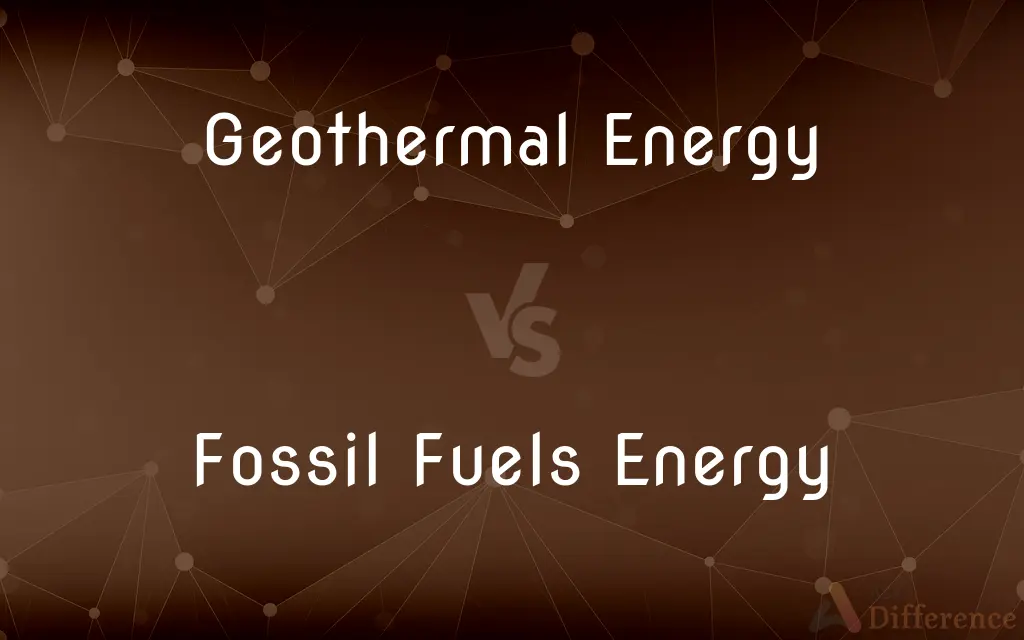Geothermal Energy vs. Fossil Fuels Energy — What's the Difference?
By Tayyaba Rehman — Published on November 6, 2023
Geothermal Energy harnesses heat from Earth's interior, offering a renewable and clean energy source. In contrast, Fossil Fuels Energy derives from ancient organic matter, emitting greenhouse gases when burned.

Difference Between Geothermal Energy and Fossil Fuels Energy
Table of Contents
ADVERTISEMENT
Key Differences
Geothermal Energy, emerging from the inherent heat of the Earth, presents an environmentally friendly, sustainable energy option. Conversely, Fossil Fuels Energy, derived from decomposed ancient organisms, although historically pivotal in industrialization, confronts criticisms for its environmental impact. Geothermal Energy leverages Earth’s consistent thermal store while Fossil Fuels Energy exploits finite, carbon-intensive resources, establishing a distinct divergence in their environmental footprints.
In an operational context, Geothermal Energy exploits steam and hot water from beneath the Earth to generate electricity with minimal emissions. Fossil Fuels Energy, on the other hand, involves burning coal, oil, or natural gas, releasing greenhouse gases. Geothermal Energy presents a clean alternative, fostering reduced emission energy production, while Fossil Fuels Energy remains implicated in climate change phenomena.
From an accessibility viewpoint, Geothermal Energy provides a relatively stable energy output, being location-dependent but not subject to weather fluctuations. In contrast, Fossil Fuels Energy has historically been widely accessible but is subject to geopolitical tensions and extraction challenges. Geothermal Energy thus promises stability in energy provision, albeit in geographically limited contexts, whereas Fossil Fuels Energy incurs variability rooted in extraction and geopolitical factors.
Considering economic aspects, Geothermal Energy demands significant initial investments but assures low operating costs. Fossil Fuels Energy, while often cheaper to implement, contends with fluctuating market prices and environmental offset costs. Thus, Geothermal Energy proposes a long-term economically stable option, while Fossil Fuels Energy navigates a landscape of economic and environmental volatility.
Exploring developmental trajectory, Geothermal Energy continues to see advancements in technology, expanding its application scope. Fossil Fuels Energy, amidst environmental critiques, observes a gradual shift towards alternative energy investments. Geothermal Energy thereby situates itself as an evolving, future-oriented energy source, while Fossil Fuels Energy faces progressive displacement in global energy strategies.
ADVERTISEMENT
Comparison Chart
Source
Earth’s internal heat
Decayed ancient organisms
Environmental Impact
Minimal greenhouse gas emissions
Significant greenhouse gas emissions
Accessibility
Location-dependent, stable output
Widespread, but geopolitically complex
Economic Aspects
High initial cost, low operational cost
Variable costs, market-dependent
Developmental Trend
Technologically evolving, expanding use
Gradual displacement by alternatives
Compare with Definitions
Geothermal Energy
Geothermal Energy can be harnessed from hot springs, geysers, and geothermal reservoirs.
The hot springs are not just tourist attractions but also sources of Geothermal Energy.
Fossil Fuels Energy
Fossil Fuels Energy can be utilized in electricity generation and transportation.
Fossil Fuels Energy powers numerous vehicles, contributing to global carbon emissions.
Geothermal Energy
Geothermal Energy leverages the Earth’s internal heat to produce energy.
Geothermal Energy provides Iceland with a substantial portion of its electricity.
Fossil Fuels Energy
Fossil Fuels Energy is characterized by its significant greenhouse gas emissions.
The coal plant, a source of Fossil Fuels Energy, has faced criticism for its emissions.
Geothermal Energy
Geothermal Energy offers a reliable and constant power source.
Despite weather fluctuations, Geothermal Energy ensured a stable power supply.
Fossil Fuels Energy
Fossil Fuels Energy originates from the combustion of coal, oil, or natural gas.
Fossil Fuels Energy has historically powered industrial revolutions and modernization.
Geothermal Energy
Geothermal Energy usage involves geothermal power plants and direct-use applications.
Geothermal Energy heats the greenhouse through direct-use applications.
Fossil Fuels Energy
Fossil Fuels Energy’s availability is subject to geopolitical and extraction factors.
The country’s dependency on Fossil Fuels Energy influenced its international relations.
Geothermal Energy
Geothermal Energy is renowned for its minimal environmental impact.
Utilizing Geothermal Energy, the power plant significantly reduced its carbon emissions.
Fossil Fuels Energy
Fossil Fuels Energy involves extraction processes like mining and drilling.
The oil rig operates tirelessly, extracting resources for Fossil Fuels Energy.
Common Curiosities
Is Geothermal Energy considered renewable?
Yes, Geothermal Energy is considered a renewable energy source.
What is the primary source of Geothermal Energy?
Geothermal Energy primarily originates from the inherent heat within the Earth.
How does Fossil Fuels Energy impact the environment?
Fossil Fuels Energy contributes significantly to greenhouse gas emissions and climate change.
Is Fossil Fuels Energy finite or infinite?
Fossil Fuels Energy is finite, derived from limited, non-renewable resources.
What materials are considered Fossil Fuels?
Coal, oil, and natural gas are primary sources of Fossil Fuels Energy.
How has Fossil Fuels Energy historically influenced economies?
Fossil Fuels Energy has historically driven industrialization and economic development but also environmental and geopolitical challenges.
Can Geothermal Energy be utilized for residential heating?
Yes, Geothermal Energy can be used for residential heating through geothermal heat pumps.
How do market prices impact Fossil Fuels Energy usage?
Market prices directly influence Fossil Fuels Energy production and consumption, affecting economic and policy decisions.
How reliable is Geothermal Energy as a power source?
Geothermal Energy is highly reliable, offering stable, continuous power production.
What are the primary uses of Fossil Fuels Energy?
Fossil Fuels Energy is widely used in electricity generation, transportation, and industrial processes.
What are some challenges of Geothermal Energy extraction?
Geothermal Energy extraction can be challenged by location specificity and initial installation costs.
What regions are prominent for Geothermal Energy production?
Prominent regions for Geothermal Energy include parts of the USA, Iceland, Italy, and the Philippines.
How does Fossil Fuels Energy extraction impact ecosystems?
Fossil Fuels Energy extraction, such as drilling and mining, can disrupt ecosystems and pose environmental risks.
How does the cost of utilizing Geothermal Energy compare to other sources?
Geothermal Energy often involves high initial costs but provides long-term, stable, low operating costs.
Share Your Discovery

Previous Comparison
Ordinal Data vs. Interval Data
Next Comparison
Clay vs. SandAuthor Spotlight
Written by
Tayyaba RehmanTayyaba Rehman is a distinguished writer, currently serving as a primary contributor to askdifference.com. As a researcher in semantics and etymology, Tayyaba's passion for the complexity of languages and their distinctions has found a perfect home on the platform. Tayyaba delves into the intricacies of language, distinguishing between commonly confused words and phrases, thereby providing clarity for readers worldwide.












































